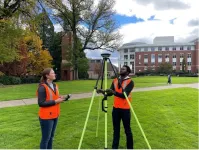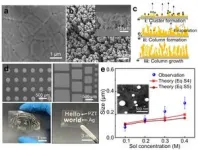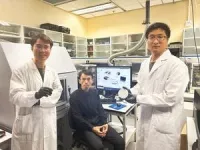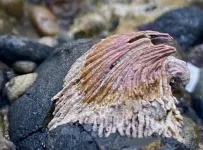(Press-News.org) CORVALLIS, Ore. – Oregon State University is one of four institutions selected to advance a federal effort to modernize the National Spatial Reference System, which underpins surveying, mapping, autonomous vehicle navigation, precision agriculture and the rest of the United States’ geospatial economy.
OSU will receive $6.5 million over five years from the National Oceanic and Atmospheric Administration for research to be conducted by the new Geospatial Center for the Arctic and Pacific, or GCAP. The funding is through NOAA’s National Geodetic Survey and is part of nearly $20 million awarded overall.
The other funding recipients are Michigan State University, Scripps Institution of Oceanography and Ohio State University.
“Society and our technologies are increasingly connected and spatially aware,” said GCAP director Chris Parrish of the OSU College of Engineering. “Groundbreaking advances are occurring in areas like self-driving vehicles, smart cities and geospatial artificial intelligence. What all of those have in common is the need for accurate, consistent spatial coordinates that define locations on, above or below the Earth’s surface.”
The foundation of those technologies, and the entire U.S. geospatial economy, is the National Spatial Reference System. The system is the basis for how spatial coordinates throughout the nation are determined, but its last major update was four decades ago and modernization is critically needed to meet 21st century accuracy demands, Parrish said.
“GCAP will contribute impactful geodetic research, infrastructure, education and workforce development to support a new, diverse generation of geodesists, surveyors and geospatial professionals,” he said.
Parrish notes that GCAP includes representation from the Columbia River Inter-Tribal Fish Commission, the Yurok Tribe and the University of Alaska Anchorage, and that GCAP research will improve resilience to coastal and seismic hazards through enhanced monitoring capabilities.
END
Oregon State to receive $6.5M for federal effort to modernize geospatial coordinate system
2023-11-09
ELSE PRESS RELEASES FROM THIS DATE:
The Lancet: Studying medicine, Nazism, and the Holocaust crucial to strengthening medical education and ethics today
2023-11-09
Peer-reviewed/ review, analysis and opinion
The Lancet: Studying medicine, Nazism, and the Holocaust crucial to strengthening medical education and ethics today
Most comprehensive report to date on medical atrocities under Nazism and during the Holocaust – and their implications for today – details the central role health professionals played in formulating and carrying out the antisemitic, racist, and inhumane policies and practices during the Nazi regime.
The Commission challenges long-held misconceptions about medicine in the Nazi era, including the claim that medical crimes were carried out by only a ...
New study examines long term effectiveness of live shingles vaccine
2023-11-09
The effectiveness of live zoster (shingles) vaccine is highest in the first year after vaccination and then wanes substantially. But it continues to provide some protection against shingles and its complications ten years after vaccination, even in patients with a weakened immune system, finds a study published by The BMJ.
Vaccine effectiveness is a measure of how well vaccines work to protect communities in the real world.
Herpes zoster, commonly known as shingles, is a painful rash caused by reactivation of the chickenpox virus. It’s much more common among people aged 60 and older and those with a weakened ...
Latest results from PHOEBE trial show patients with advanced HER2-positive breast cancer live longer on pyrotinib
2023-11-09
Lisbon, Portugal: Patients with HER2-positive breast cancer that has started to spread to other parts of the body survive for longer if they are treated with a new drug called pyrotinib, according to results from the longest follow-up of the PHOEBE randomised clinical trial in China.
Presenting the latest results at the Advanced Breast Cancer Seventh International Consensus Conference (ABC 7), Professor Xichun Hu, of Fudan University Cancer Hospital, Shanghai, China, said the researchers had been able to analyse data on overall survival from the trial up to March 15, ...
Barnacle bends shape to fend off warm-water sea snails on the move
2023-11-09
Some barnacles are ‘morphing’ to protect themselves from predatory warm-water sea snails, which are expanding into their territory due to climate change.
Research led by the University of Southampton and published in the Journal of Biogeography shows how temperate prey species are adapting to changing water temperatures, which carry the threat of warm-water predators encroaching into their territory.
As global sea-surface temperatures rise and the number of marine heatwaves increase under global heating, coastal marine communities are changing. Warm-water predators ...
AI can map giant icebergs from satellite images 10,000 times faster than humans
2023-11-09
AI can map giant icebergs from satellite images 10,000 times faster than humans
Scientists have trained an artificial intelligence (AI) system to accurately map - in one-hundredth of a second - the surface area and outline of giant icebergs captured on satellite images.
It is a major advance on existing automated systems which struggle to distinguish icebergs from other features in the image. Manual - or human - interpretation of the image is more ...
People who contribute least in crowdsourcing can do the most to improve a public good
2023-11-08
Whether talking about the office kitchen, hiking trails or ratings on Yelp, there are always people who put in effort to leave those spaces better. There are also those who contribute nothing to that public good.
New research using large-scale online experiments suggests that rewarding people to contribute to a virtual public good, such as a simulated online rating for a ferry system, increased the accuracy of the ratings and improved the overall quality of that resource.
The multidisciplinary team, including researchers from the University of California, Davis; Hunter College, College of New York; the Max Planck Institute for ...
1 in 25 carries a genotype that is associated with a shortened lifespan
2023-11-08
1 in 25 carries a genotype that is associated with a shortened lifespan
Scientists at deCODE genetics, a subsidiary of Amgen, have published a study on actionable genotypes detected in the Icelandic population and their association with lifespan. The results of this study are among the things that have motivated the government of Iceland to announce a nationwide effort in precision medicine. As the delivery of precision medicine to a population requires considerable amount of data on genomics, transcriptomics and proteomics of the population, Icelanders are currently exceptionally well suited for ...
Zen and the art of mitochondrial maintenance: The machinery of death makes a healthier life
2023-11-08
While we all aspire for a long lifespan, what is most coveted is a long period of vigor and health, or “healthspan,” that precedes the inevitable decline of advancing age. Researchers at UC Santa Barbara have discovered that instruments of death that cells use to commit suicide when things go wrong contribute to making a longer and healthier life by revitalizing the specialized cellular compartments called mitochondria.
Mitochondria generate the energy for all of our activities, from movement to thought. These power plants inside our cells descended ...
MPFI researcher awarded $1.2 Million from Chan Zuckerberg Initiative
2023-11-08
Dr. Vidhya Rangaraju has been named a recipient of the Chan Zuckerberg Initiative’s “Ben Barres Early Career Acceleration Award,” which will provide her lab with $1.2 million over four years to study dysfunctions of brain energy supply.
Dr. Rangaraju is a Research Group Leader at the Max Planck Florida Institute for Neuroscience (MPFI). With this award, her lab will investigate the causes of disrupted energy supply in neurons that lead to cognitive decline in amyotrophic lateral sclerosis (ALS). ...
With new grant, RPI works to shrink microchips, expand semiconductor workforce
2023-11-08
Transistors — the tiny on-off switches inside microchips — have gotten smaller and smaller over the years, increasing computing power and enabling smaller devices. During that time, the copper wires that connect these switches have likewise shrunk.
However, smaller, thinner wires create a big problem, said Daniel Gall, professor of materials science and engineering at Rensselaer Polytechnic Institute.
“The job of the wire is to conduct electrons — electricity. Imagine a wire as a crowded hallway that the electrons have to get through. The narrower the hallway, the more the electrons bump into things and scatter. We call that resistance,” Gall ...






